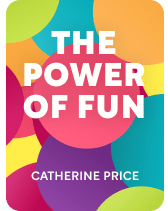

This article is an excerpt from the Shortform book guide to "The Power of Fun" by Catherine Price. Shortform has the world's best summaries and analyses of books you should be reading.
Like this article? Sign up for a free trial here.
How can playfulness help you connect with your true self? What do you enjoy so much that it causes you to lose your sense of time?
In The Power of Fun, award-winning science writer Catherine Price uses research and personal anecdotes to explain why fun is fundamental to living a happy and healthy life. She defines fun and explains why it matters throughout our lives.
Keep reading to learn why fun is important in various aspects of life.
What Is True Fun, & Why Does It Matter?
First, we’ll look at what fun means, and then we’ll focus on why fun is important. According to Price, the word fun has been used to describe so many different types of experiences that it has begun to lose some of its meaning. We use fun to describe anything from getting a massage to going skydiving. She explains that many of us also mistake activities like binge-watching a show or scrolling on social media for fun when these activities are a little more than a distraction or passive entertainment that rarely leaves us feeling better than before.
Price focuses on what she calls True Fun, the kind of fun that leaves you feeling energized and inspired. She argues that True Fun isn’t only the most enjoyable kind of fun, but it’s also good for your physical and emotional well-being. Price defines True Fun as the intersection of playfulness, connection, and flow. We’ll discuss each component in turn.
(Shortform note: As Price acknowledges, there’s limited research on the nature of fun. Price’s definition of True Fun, for example, is based solely on personal experience and what she extrapolated from the reported experiences of 1,500 volunteers. However, the limited research that exists seems to align with Price’s conclusion that playfulness (or pleasure without purpose), connection, and flow are key elements of what makes experiences enjoyable.)
Playfulness
Price defines playfulness as a liberating attitude of curiosity, openness, and willingness to experiment. Playfulness is about doing something just for the sake of doing it, not because it is “productive” or has a higher purpose. Playfulness is less about any specific activity than the attitude you bring to what you’re doing.
| What’s Your Play Personality? According to Stuart Brown, the founder of the National Institute for Play, the type of play or activity does make a difference. Brown suggests that as they grow up, people tend to gravitate toward certain types of play over others. Based on thousands of interviews and observations, Brown identified eight types of play that correlate with eight “play personalities”: The Collector enjoys having and holding collections of objects or experiences. The Competitor accesses the euphoria and creativity of play by participating in a competitive game with specific rules. The Creator/Artist finds joy in making things, whether it be painting, woodworking, or even decorating a room. The Director enjoys planning and executing scenes and events and is a born organizer. The Explorer prefers to explore the world physically, emotionally, or mentally. The Joker’s play always revolves around some kind of foolishness. The Kinesthete likes to move and may engage in sports or other physical activities to access the joy and openness of play. The Storyteller finds imagination to be the key to the joys of play and may engage in activities like reading, writing, or performing to create an imaginative world. Brown explains that people often see themselves in multiple play personalities but that only one tends to be dominant. Identifying your dominant play personality can be helpful as you try to identify activities that naturally excite and vitalize you. |
Citing the work of Stuart Brown, psychiatrist and founder of the National Institute for Play, Price explains that engaging in play can allow people to get back in touch with their most authentic selves. Studies have also shown that play enhances creativity, improves memory, and decreases stress, in addition to facilitating deeper relationships with other people.
(Shortform note: According to Brown’s research, play not only improves people’s physical and emotional well-being but is also fundamental to healthy human development. His research shows a link between a lack of childhood play (or play deprivation) and a future propensity to violence and other antisocial behaviors. Brown argues that healthy play is a means of developing important social-emotional skills and preventing potentially violent antisocial behavior.)
Connection
Price defines connection as a sense of belonging and intimacy that arises from feeling understood and valued. Price explains that this connection can take many forms, from deep conversations with friends to spending time in nature or playing with a beloved pet. While we can be connected to places and things, Price notes that most instances of True Fun involve connecting with other people.
(Shortform note: Research supports Price’s claim that human connection heightens the experience of fun. One study found that fun is more enjoyable when you experience it with others, especially with friends. People who had fun with a friend reported feeling more energized and excited than people who had fun alone or people who had fun with strangers.)
Research suggests that human connection is central to our physical and emotional well-being. While loneliness has been linked to a variety of health issues (for example, high blood pressure, heart disease, depression, and dementia), studies have shown that strong social relationships are a better indicator of long-term health outcomes than almost any other indicator, including income, IQ, social class, or genetics.
(Shortform note: Social connection has such a strong impact on health outcomes that it is sometimes prescribed to patients. The practice, known as social prescribing, has become more systematic in the UK’s healthcare system and is part of a larger shift in medicine toward a more holistic approach that recognizes the intersecting variables that can impact a patient’s health and well-being.)
Flow
The third component of True Fun is flow. Price defines flow as a state of complete absorption in an activity, where a person is fully immersed in the present moment and loses track of time. She explains that flow is characterized by effortless concentration and a feeling of being in control, despite the challenge of the activity. Flow can be experienced in a variety of activities: playing music, engaging in a sport or physical activity, or even in everyday tasks like cooking or gardening.
(Shortform note: Mihaly Csikszentmihalyi, author of the seminal book Flow, describes a flow state as an optimal experience in which people are working voluntarily to achieve something important. He emphasizes that a key characteristic of flow is working toward a clear goal. However, Price argues that True Fun (the intersection of playfulness, connection, and flow) is often characterized by a lack of higher purpose. So while Price draws extensively on Csikszentmihalyi’s work, her discussion of flow doesn’t directly correspond with his.)
Price argues that opportunities for flow are crucial for a long and fulfilling life. She equates flow with the Japanese concept of ikigai, which roughly translates to “a reason for being.” Price points to the research of Héctor García and Francesc Miralles, authors of Ikigai, who studied the residents of the Japanese island of Okinawa. The authors contend that Okinawa residents live especially long lives because they practice ikigai every day by engaging in meaningful and joyful activities—in other words, by engaging in flow.
(Shortform note: Price correctly identifies that both ikigai and flow are characterized by focused engagement and present-mindedness, but they aren’t direct equivalents. Ikigai tends to be a broader, more holistic concept that encompasses all aspects of life, while flow is more specific to a particular activity or task. Ikigai is a way of life, while flow is more often experienced within a defined time period.)
According to Price, the convergence of the three variables of playfulness, connection, and flow often leads to experiences of True Fun, which will vary from person to person. For example, for different people, playing rugby, birdwatching, or online poker might each meet the requirements for True Fun. Price concludes that if each of these three separate components of True Fun has so many benefits, then the combination of all three must be even more potent.
(Shortform note: Price’s conclusion that the individual benefits of all three variables mean that there are greater benefits of the three in combination fails to account for potential interaction effects. Interaction effect refers to the way in which the effect of one variable on an outcome depends on the level or value of another variable. In other words, the relationship between two variables isn’t simply additive but can depend on the values of other variables. It is important to consider interaction effects in scientific research to better understand the complexity of relationships between variables and to avoid misinterpretation of results or overgeneralization in findings.)
Exercise: Reflect on Your Experiences of True Fun
Price suggests that, before adding more fun into your life, it’s important to understand what fun means to you.
- Think back to an experience that you would unequivocally describe as fun. Describe that experience briefly below.
- Identify three characteristics of this experience that made it fun. For example, was it with a good friend, in a beautiful place, or doing an activity that was new to you?
- Price argues that True Fun occurs at the intersection of playfulness, connection, and flow. Which of these elements (if any) was a part of the experience you described?

———End of Preview———
Like what you just read? Read the rest of the world's best book summary and analysis of Catherine Price's "The Power of Fun" at Shortform.
Here's what you'll find in our full The Power of Fun summary:
- Why fun is fundamental to living a happy and healthy life
- How modern society has made it harder to prioritize fun
- A step-by-step guide to invite more fun into your life






